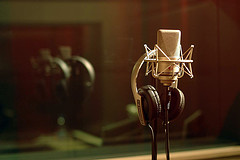- 2 reads

These days it is becoming increasingly common for businesses to use more environmentally friendly materials and alternative sources of energy, so it seems only natural that this would extend to the music industry as well. This can be seen in two examples of extraordinary recording studios that are making it possible for musicians to make great music while simultaneously reducing their impact on the environment. These studios are Brushfire Records, located in Los Angeles, and Studio A at The Premises in London.
Brushfire Records was created by singer/songwriter Jack Johnson, and the label is also home to artists such as G. Love, Matt Costa, ALO, Money Mark, Rogue Wave and Mason Jennings. A native of Hawaii and longtime surfer, Johnson has been outspoken about his love of nature and his goals to carry this over into his music career by making music and touring without harming the environment in the process. He certainly seemed to be on the right track when he and manager Emmett Malloy created the first environmentally friendly recording studio in the United States, in Los Angeles. The studio is entirely powered by solar panels that cover the roof, and all lighting is energy efficient or natural. For insulation, they used recycled scraps of denim, for flooring they used alternative materials such as cork and bamboo, and the space is sparsely decorated with second-hand furniture. Furthermore, albums released on the Brushfire Records label are packaged using recycled paper, a practice that is becoming more and more common. What is uncommon is the fact that the music made in the Brushfire studios is made using only the power of the sun, which gives it warmth that you can almost feel.
The Premises in London became the first environmentally friendly studio in the United Kingdom when they built Studio A, which runs entirely on solar power. The studio was built with recycled materials and uses low-energy equipment. In addition to being environmentally friendly it prides itself on being economically friendly as well, as costs to record at the studio are lowered by the use of solar and alternative energy. Following the completion of the studio, musician Johnny Borrell of the band Razorlight recorded a song in Studio A as part of the political campaign The Big Ask. The campaign lobbied for government to pass a climate change law in which the UK would commit to cutting carbon dioxide emissions by at least three per cent each year. Then in 2008, the studio, along with environmental organizations Friends of the Earth and the Renewable Energy Association, lobbied for government to financially reward homes and businesses that generate their own clean renewable energy, which resulted in an amendment to the Energy Bill. Artists that have recorded in Studio A include Bloc Party, Lily Allen, Hot Chip and the Klaxons.
So if it is possible for a recording studio to be environmentally friendly and still produce high-quality music, why aren’t more studios doing it? While the up-front cost of installing solar panels and power inverters may be a deterrent, they money saved by using solar energy will pay it all back in the long run. One can only hope that others will follow in the footsteps of Brushfire Records and The Premises and that music created using alternative means of power will soon be an industry standard.

